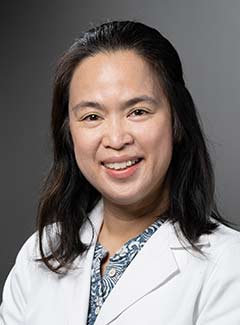
- Residency: Seton Hall University School of Health and Medical Sciences - Trinitas Regional Medical Center
- Fellowship: Northwell Health, Staten Island University Hospital
- Medical School: University of the East Ramon Magsaysay Memorial Medical Center
Gwenalyn Garcia, MD, is a fellowship-trained hematologist and medical oncologist who cares for patients at UVA Cancer Center Augusta. Part of the UVA community oncology network, this clinic allows patients to receive advanced care and the latest research-based treatment options closer to home.
Q&A: Gwenalyn Garcia, MD
When did you begin practicing at UVA Cancer Center Augusta?
I started at UVA on August 1, 2021. I am in my fifth year of practice. I have been practicing community oncology since graduating from fellowship. Most recently, I worked in West Virginia, where I treated a wide variety of cases, including benign hematology and all different types of cancers.
Why did you choose community oncology rather than specializing in a particular type of cancer?
I chose community oncology rather than specializing because I like the variety of cases. I like the relationships that I’m able to build, being that first point of contact for cancer patients and being available to support them through their challenging treatment.
I also enjoy collaborating with a patient’s other doctors, their primary care physicians, and other specialists involved in their care like surgeons and radiation oncologists.
What is your clinical focus?
Mainly solid tumors. We see a lot of lung cancer and colon cancer because those are the most common in our community.
What attracted you to UVA Cancer Center?
Even though we’re an academic medical center, we have a strong focus on building care in the community. We go out to where patients are rather than requiring them to drive an hour or more to receive care.
We’re very happy to have the specialty support when needed, and we work in tandem with surgeons and radiation oncologists in Charlottesville. But we provide a majority of a patient’s care close to home, and they’re happy about that.
How would you describe your approach to patient care?
Collaborative. When I first meet a patient, I like to get to know them in detail. I review their medical records, but I also listen to them and have them tell their story from their point of view, from the family’s point of view.
I try to determine what their values are in terms of treatment, whether they are very motivated to go through aggressive treatment or whether they value quality of life and prefer to avoid the side effects that may come with some of the more aggressive treatments available.
I believe in shared decision-making between myself and the patient and their family, taking into account both my own knowledge of cancer treatment guidelines, as well as the personal values of the patient.
I also collaborate daily with our chemotherapy nurses, nutritionist, social workers, and with the main cancer center if a patient needs specialized care. We are very much a whole cancer team here.